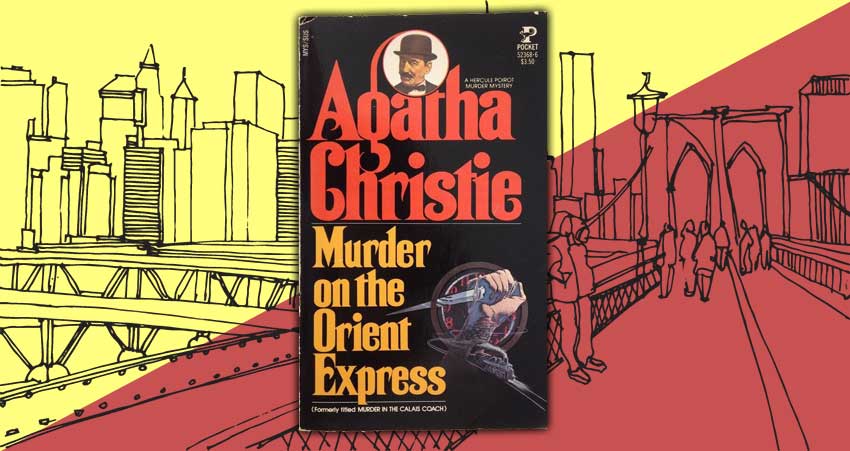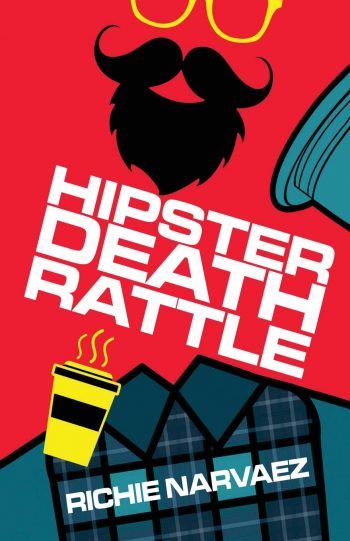I Met Hercule Poirot in Brooklyn
By Richie Narvaez
March 12, 2019He was my substitute teacher...

As we filed in, there at the head of this class was someone who could best be described as an older gentleman, in the truest sense of both words. En verité, his head was not egg-shaped, and it was thinly covered with white hair. He was easily in his 60s, had a thin white mustache, and wore a suit and tie. (This was a public school, not private, and most teachers were in shirtsleeves, the groovy ones in jeans). His diction was posh, distinguished, like the fancy people on TV spoke, and he said our Spanish teacher would be out for two weeks. I was in 7th grade, in J.H.S. 50, in Williamsburg, Brooklyn.
Williamsburg in the 1970s was gritty and graffitied, and the sound of gunshots in the night was not uncommon. Quel pays sauvage, perhaps, to some. In any case, on that day, in that unlikely place, I met Hercule Poirot.
The name of the substitute teacher is lost in the mists of my memory. But I do remember two things. That at the start of class he handed out ditto’d sheets of a riddle called “A Most Unusual Paragraph.” Perhaps you’ve come across it, mes enfants?
This is an unusual paragraph. I’m curious as to just how quickly you can find out what is so unusual about it. It looks so ordinary and plain that you would think nothing was wrong with it. In fact, nothing is wrong with it! It is highly unusual though. Study it and think about it, but you still may not find anything odd. But if you work at it a bit, you might find out. Try to do so without any coaching.
The class was stymied. Or bored. Or in the midst of hormonal fevers. I was a nerd par excellence, however. Did I solve it? I must confess: Non. But I did remember that a previous substitute from another class had handed out the same ditto, and I remembered the answer.
In a quivering voice, I stated: “There’s no ‘e’ in it.”
“Excellent! Very good! The letter ‘e’ is the most popular letter in the English language and yet it is not used here!” M. Distingué Substitute Teacher was very impressed. “It’s important to use the little gray cells,” he said. “Does anyone know what the little gray cells are?”
Again, les crickets. Now I had some experience with science fiction science, and I felt I could make a passing guess at this.
Hand raised, I said, “The brain!”
Christie presented to me one of the most fascinating and exotic new worlds I’d ever imagined—and I had gone to Mars with Edgar Rice Burroughs.
The substitute’s thin frame rocked with joy. “Have you ever read Agatha Christie?” he asked me, just me. He moved to the front desk and the only thing on it, besides the attendance sheet, was a paperback copy of Murder on the Orient Express. He handed it to me and said I could borrow it if I wanted.
“Sure,” I said, feeling very special. It was a weathered paperback, yellow-brown pages, and I, like the vain boy of Joyce’s “Araby,” had a love for such things. Until then, I had been living on a steady diet of comic books and Conan the Barbarian pulp, so I was not too put off. The text of the Christie book did seem very tiny, and there were certainly no pictures.
But when the substitute left the class to its own devices for the remainder of the period, instead of getting ahead on homework, I immediately dove into the book.
It was five o’clock on a winter’s morning in Syria. Alongside the platform at Aleppo stood the train grandly designated in railway guides as the Taurus Express.
Where in the world was Syria? Aleppo—wasn’t that a Marx Brother? Here were new kinds of riddles, new things I had to figure out. Once I got the book home I read it with the dictionary at hand. Bon Dieu, the French phrases, however, eluded me until I took French in high school.
Christie presented to me one of the most fascinating and exotic new worlds I’d ever imagined—and I had gone to Mars with Edgar Rice Burroughs. Didn’t that train sound amazing. Who were these characters? And who was this little Hercules guy with the mustache who seemed so brilliant?
I confess I did not become a big Christie fan immediately, however. My tastes needed more time to cure, and I do remember thinking the resolution was a bit sneaky on her part. “All of them did it?!” #spoilers But I was affected. I was fascinated.
I am a crime fiction writer now but also a teacher, and I can appreciate what M. Distingué was trying to do for us, and what he did for me. In that moment when I took the book, he had done a good day’s work. (I returned it by the end of the second week. He asked if I liked it, and shy as always to say very much, I said, “Uh huh.”) Mes amis, I only wish, that like so many people affected by caring teachers, that years later I could tell him how much his book had meant to me and how much the world of mystery it fascinates me still.

About Hipster Death Rattle:
Murder is trending. Hipsters are getting slashed to pieces in the hippest neighborhood in New York: Williamsburg, Brooklyn. While Detectives Petrosino and Hadid hound local gangbangers, slacker reporter Tony Moran and his ex Magaly Fernandez get caught up in a missing person’s case—one that might just get them hacked to death.
Filled with a cast of colorful characters and told with sardonic wit, this fast-moving, intricately plotted novel plays out against a backdrop of rapid gentrification, skyrocketing rents, and class tension. New Yorkers and anyone fascinated with the city will love the story’s details, written like only a true native could. Entertaining to the last, this rollicking debut is sure to make Richie Narvaez a rising star on the mystery scene.
